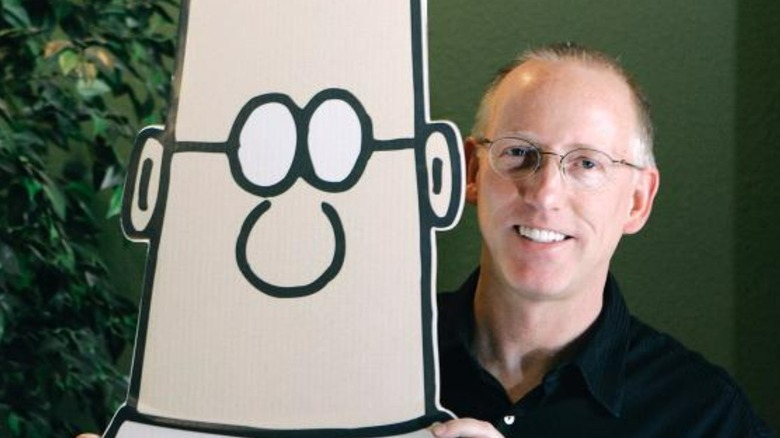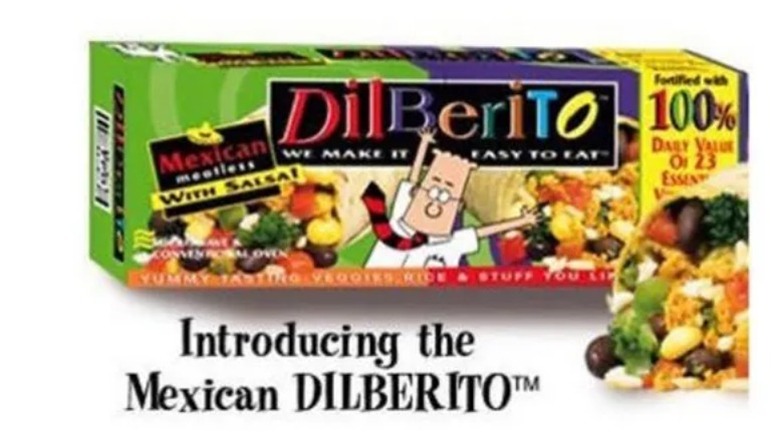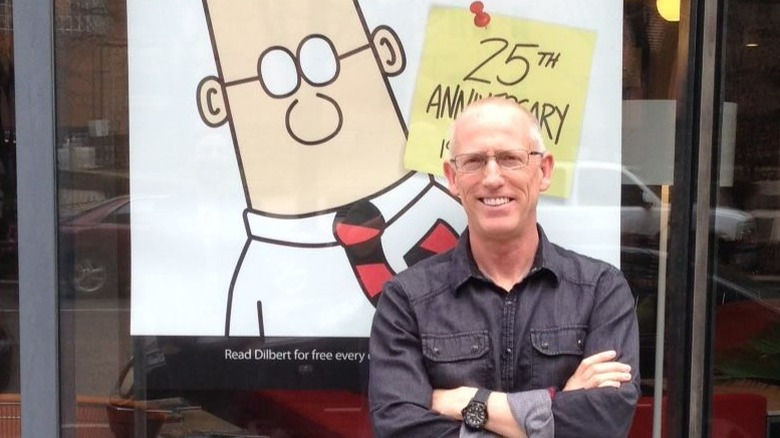The Story Of The Failed, Comic-Inspired Dilbert Burrito
There's really something special about Sunday comics, isn't there? The sensational articles and dry stock market reports give way to almost two full pages of color comic strips, gags, puzzles, and zingers. Whether you're a fan of the wishy-washy Charlie Brown of "Peanuts," the military stylings of "Beetle Bailey," or the comical misadventures of lasagna-loving "Garfield," the world of the Sunday comics page is filled with zany, oddball, and even heroic characters. But there's one comic in particular that stands out, detailing a hero who finds himself navigating a place far more treacherous and strange than any fantasy kingdom: the corporate world.
Introduced in the early '90s, Scott Adams' "Dilbert" details the life of the titular Dilbert, an engineer in a company who seems trapped in a surreal nightmare of corporate banality and incompetence. Much of the comic's humor comes from the lampooning of corporate culture, influenced by Adams' earlier career working in the Pacific Bell Telephone Company, where his banal, go-nowhere job inspired him to create an outlet for his complaints (via Harvard Business Review). While "Dilbert" today is also known for Adams' somewhat controversial views (via Fox News), "Dilbert" has been seen as a staple of the newspaper comic industry, even having its own animated show in the late '90s (via IMDb).
But where exactly does a comic about corporate culture and burritos come together? It seems that all these years later, it's still kind of a mystery.
Dilbert-themed burritos were a brief fad in the late '90s
On July 5, 1999, Supermarket News trumpeted that a new type of burrito was coming to 7-Eleven stores across the country. It would come in four flavors, cost around $2.29 per serving, and feature the iconic nonplussed, glasses-wearing face of Dilbert printed smack dab on the wrapper. This was no ordinary burrito: this was the "Dilberito."
As Scott Adams explained to the San Francisco Business Journal in 1999, he wanted to create the "Dilbertito," a meatless, vegan-friendly burrito, as a solution to what Adams saw as a growing health problem. Adams believed that a lack of a good, healthy diet was behind many major health concerns in the world and that most people's diets consist of cheap, nutrition-less fast food. If people were to have a cheap, yet nutritious meal that could be made quickly and easily, Adams reasoned, people's health would begin to improve. The Dilbertito would become the "blue jeans" of food — cheap, accessible, easy to make, and packed full of nutritional value.
To help promote the Dilbert-themed burrito, there was even a website launched in the early 2000s, which extolled the many wholesome qualities of the Dilbertito and other "fun stuff." To think that there was a time people ate Indian Dilbertitos while playing a Dilbertito-themed computer game – which you can still play today! Oh, the sweet bygone days of the '90s.
An impossibly surreal product given form
This may come as a surprise to you, but it seemed that people weren't exactly storming the grocery stores for a vegan burrito based on a comic strip about corporate incompetence. While Scott Adams had a noble goal — provide healthy food for hard-working everyday people — it would appear that the idea didn't pan out how he wanted it to.
As AV Club reminisces, the world seemed utterly baffled by the introduction of the Dilbertito, this almost satirical joke from Adams. It didn't seem real, as if it were conjured up in some kind of dream and brought to life in a cold sweat following a startling, yet fleeting revelation. CNN called the Dilbertito "sober and utilitarian," while The New York Times describes it as something more like someone designing a food product with a cold, technological focus rather than any real flavor or taste. It was a meal that seemed to drift between the satirical world of "Dilbert" and a serious message about health. The Dilbertito was both impossible and possible, something from an incomprehensible fever dream given solid form as a physical and buyable product.
As for Adams, he left the world of food behind, considering the Dilberito a failure, a lesson to be learned. Adams would later describe the nutritional value of the burrito as such: "Three bites of the Dilberito made you fart so hard your intestines formed a tail."
A poignant message for a truly unique product.


